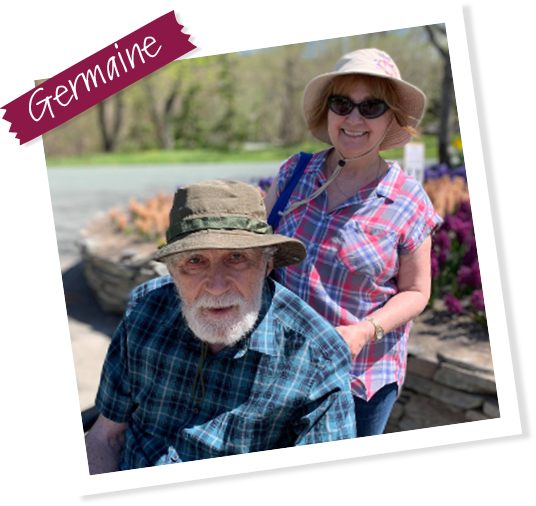Germaine, caring for her husband
 I’m a mother of three daughters, grandmother of three, two girls and a boy: and a caregiver to my husband with the Parkinson’s Plus Syndrome Multiple System Atrophy-P, the P stands for Parkinson’s disease presentation, and he has dementia. I was a nurse and have been a leader with Girl Guides of Canada for over 40 years and was Deputy Provincial Commissioner. My husband and I met while I was working at the university campus where he was a professor. After asking me out many times I finally agreed, and we have been inseparable ever since. He was handsome and smart but really what attracted me was his caring personality; he was and remains one of the nicest men I have ever met. We loved walking, hiking, traveling and I love to read. Although he is still here, sometimes I really miss him.
I’m a mother of three daughters, grandmother of three, two girls and a boy: and a caregiver to my husband with the Parkinson’s Plus Syndrome Multiple System Atrophy-P, the P stands for Parkinson’s disease presentation, and he has dementia. I was a nurse and have been a leader with Girl Guides of Canada for over 40 years and was Deputy Provincial Commissioner. My husband and I met while I was working at the university campus where he was a professor. After asking me out many times I finally agreed, and we have been inseparable ever since. He was handsome and smart but really what attracted me was his caring personality; he was and remains one of the nicest men I have ever met. We loved walking, hiking, traveling and I love to read. Although he is still here, sometimes I really miss him.
I noticed the symptoms of what I thought was Parkinson’s disease in my husband Peter in 2016. I wished I was wrong but he needed help. At that point I became his advocate, going with him to doctors and various other medical appointments. The biggest challenge was getting him an appointment with a neurologist. Six months went by after we had asked for a referral from his GP and we still hadn’t heard back. His urologist for his prostate cancer, was the doctor that detected that he could have Parkinson’s from the way he was moving.
He finally got his appointment in 2017 and was diagnosed with Parkinsonism. His condition continued to worsen, and new symptoms appeared. I began thinking of myself as his care partner as I gradually took on the driving, the bill payments, the taxes and banking. I also started attending Parkinson’s meetings and activities with him like participation in the Big Program and other exercises and physio. His neurologist retired and the quest for a new neurologist and advocating for him became a real job. He did not get to see another neurologist until May of 2019. In the meantime, I was doing my own research and listening to relevant university lectures online. I told our daughters that if he didn’t have Parkinson’s disease, he had something worse, because he was degenerating much quicker than a patient with Parkinson‘s disease normally would.
With the rapidly worsening symptoms and the addition of autonomic features, my fears became reality when he was diagnosed with Parkinson’s Plus Multiple System Atrophy -P at which point, the tears just ran down my face. In the meantime, I stepped up my game further and perhaps without even realizing it. As bladder and bowel issues, blood pressure, temperature control and more difficulty with mobility and communication became more challenging, I became a true caregiver. In 2018, I started to notice that he was getting lost which is very unlike him and in 2019, he was diagnosed with dementia. I remember wishing it were anything else. I’ve had so much sorrow and grief throughout this journey. He was such an active man, a keen gardener, and his degeneration is so rapid that I haven’t caught up emotionally, although I see the loss of his functions, I haven’t quite come to terms with it.
Then when a urinary tract infection became septic and Peter got delirium, a six-week hospitalization ensued. The medical team advised me strongly that it was too much for me to care for him at home and that he should stay at the hospital until the first long term care bed became available. My daughters, busy with their own families and careers were concerned for me taking on so much. I told everyone maybe I couldn’t do it, but I had to try, so I took him home. Our Home OT Maire went out of her way to help keep my spirits up through a very challenging transition to hospital bed, commode and lift, wheelchairs and feeding tools. The professional and cheerful help of OT and PT helped me feel that I was not alone and that caregiving at home, that we both wanted, was a real possibility.
The dementia piece makes it more difficult. I’m in some level of grieving every day and I’m missing someone that is still here. Throughout this journey I have felt hopeful, hopeless, fragile and lonely – sometimes all in the same day! Just knowing that you are not alone is very important; grief counselling and Facebook caregivers’ groups have provided me some solace. I try to find something to be glad about every day, even if it’s watching the birds on the tree outside my kitchen window. My husband is dying, and I know it, so I try to find five minutes every day to grieve on my own. We have been together since I was 20, my entire adult life, and I don’t know how the future will look when he is gone. While he is here with me, I am doing everything I can to give him a decent quality of life. Peter and I are still trying to make the best of what our life is now.
